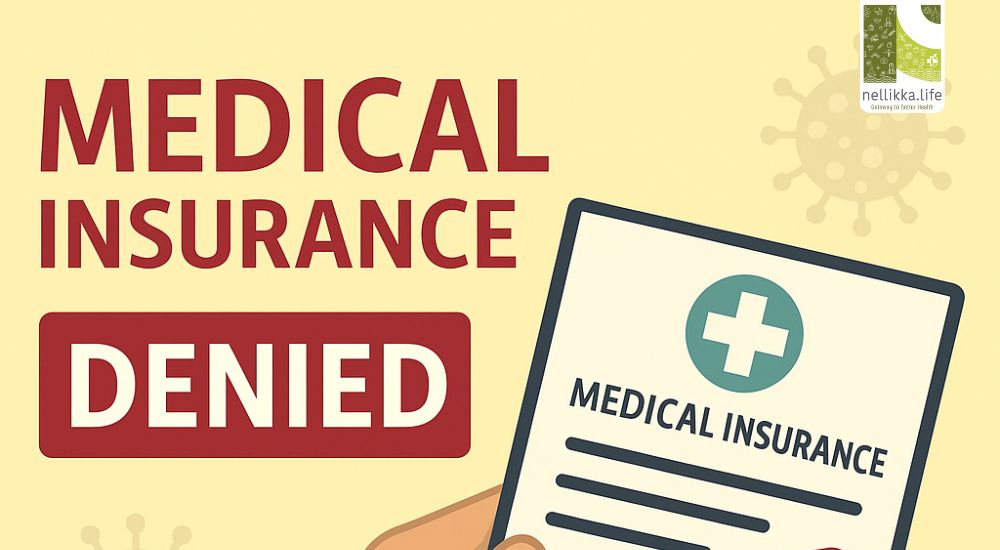Avoiding Insurance Claim Denials in India: What Every Policyholder Must Know

Sunday Editorial | The Health Ledger
Denied and Distressed: The Insurance Crisis No One Talks About
By Dr. Vishad Viswanathan MD&Chief Editor, Nellikka.life
When illness strikes, we expect healing—not haggling.
Yet across India, thousands of insured patients and families find themselves battling not their illness, but their insurance provider. Policies are in place. Premiums are paid. But when the moment of need arrives, rejection slips appear faster than reimbursements. And more often than not, the reasons lie in overlooked details, unread clauses, and systemic opacity.
According to the Insurance Regulatory and Development Authority of India (IRDAI), over 15% of claims in the private health insurance sector were either delayed or denied during the last fiscal year. Some third-party administrator (TPA) claim-to-disbursal ratios have dipped below 75%, triggering public concerns over whether policyholders are truly protected.
From my dual lens as a practicing physician and editor of Nellikka.life, I have personally witnessed the psychological and financial trauma endured by patients when claims are denied—often during their most vulnerable moments.
This editorial is not just a callout. It is a call to action.
What’s Going Wrong?
India’s insurance ecosystem is evolving—but consumer awareness is lagging behind. Despite rising health consciousness, policyholders often remain uninformed or misinformed about what their policies actually cover.
Here are the most common causes of claim denials—and how you can prevent them:
Top Reasons Why Claims Get Rejected
1. Non-Disclosure of Pre-Existing Conditions
Failure to disclose even minor health issues like diabetes or blood pressure—knowingly or unknowingly—can lead to full denial.
Tip: Disclose everything, even if managed. Ask your doctor to document your current health status.
2. Waiting Period Confusion
Most policies have 2–4 year waiting periods for certain conditions. Patients often undergo treatment prematurely, unaware their policy doesn’t cover it yet.
Tip: Review waiting periods before scheduling planned treatments.
Excluded Procedures
Cosmetic surgeries, infertility treatments, and many alternative therapies are excluded unless explicitly covered.
Tip: Always consult the exclusions list or insurer directly before proceeding.
4. Non-Network Hospitals
Cashless claims are only valid in hospitals listed under the insurer’s network. Going out-of-network means reimbursement hassles—or denial.
Tip: Confirm hospital empanelment before admission. Keep physical records for emergencies.
5. Delayed or Incomplete Documentation
Even technical lapses—like vague prescriptions, missing bills, or delayed filing (beyond 7–30 days)—can invalidate your claim.
Tip: Submit all documents within 48–72 hours and keep hospital teams informed.
6. Room Rent Limitations
Exceeding room rent caps (e.g., ₹3000/day limit, staying in ₹6000 room) may reduce not just room charges, but the entire claim on a proportional basis.
Tip: Choose room categories that align with your policy.
7. Policy Lapse
Missed renewals—even by days—can leave you uncovered during emergencies.
Tip: Set auto-reminders or auto-debits. Never assume grace periods offer full protection.
8. Policy Confusion
Many people have corporate, personal, and top-up policies, and make claims under the wrong tier, causing delays or denials.
Tip: Know the claim hierarchy: base → top-up → employer policy.
The Forgotten Fine Print: Riders & Clauses
One of the most overlooked risks is the lack of understanding of insurance riders and reliance on verbal assurances from agents.
Here’s the reality:
- If it’s not in the policy document, it’s not covered—regardless of what the agent said.
- Riders like maternity, critical illness, or ambulance cover often come at additional cost.
- Many applicants sign policies without reading or questioning, often trusting intermediaries.
Tip: Read the entire brochure. Ask for explanations. Understand what you’re signing up for.
Know Your Free-Look Period
Every new insurance policy comes with a 15-day “free-look” window, during which you can review and cancel the policy without penalty (minus minor charges). This is your right—and your only chance to re-evaluate what you’ve bought.
Tip: Use this period to consult a medical professional or independent advisor to assess policy adequacy.
\What the Data Says: Denial Rates Across Sectors
According to IRDAI’s 2023 Annual Report:
- Claim settlement ratio for private insurers: ~89.5%
- Claim repudiation (rejection) rate in individual health insurance: ~8–12%
- Group health plans show better ratios, but lack personal tailoring
- Common denial reasons include non-disclosure, documentation errors, and coverage ambiguity
A Doctor’s Plea
Behind every denied claim is not just a document—it’s a distraught family. As healthcare providers, we see the grief, rage, and confusion that patients face when their financial safety net crumbles.
What can be done?
- Patients must carry their medical history and insurance details to hospitals.
- Hospitals should train dedicated insurance coordinators.
- Doctors must ensure accurate coding (ICD) and transparent discharge summaries.

Final Word
Empower the Patient
Health insurance is not a favor. It is a financial contract. And it is time patients began treating it as such.
Don't just buy what is sold to you—buy what you understand. Your protection lies in your awareness.
Ask questions.
Read the fine print.
Keep everything documented.
Because when the time comes, it’s not just your claim that’s at risk—it’s your peace of mind, your family’s stability, and your right to dignified care.
Dr. Vishad Viswanath, MD & Chief Editor




